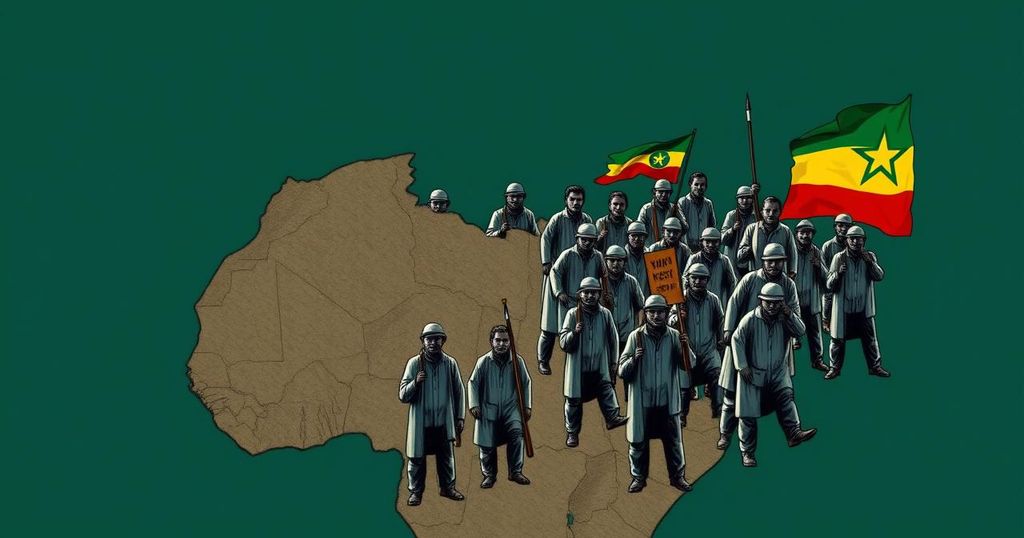The article discusses the formation of a coalition comprising Egypt, Eritrea, and Somalia, aimed at countering Ethiopia’s regional assertiveness under Prime Minister Abiy Ahmed. Following a recent summit, the leaders agreed on security cooperation to enhance Somalia’s capabilities against terrorism and other threats. This alignment reflects broader regional tensions, particularly regarding the Nile River and Uganda, while also raising concerns of fuelling internal conflict in Somalia.
An emerging coalition, comprising Egypt, Eritrea, and Somalia, poses a significant challenge to Ethiopia, particularly in the context of Prime Minister Abiy Ahmed’s perceived regional aggressiveness. Following a recent summit in Asmara, the leaders from these countries established a security partnership aimed at coordinating efforts to bolster Somalia’s governmental institutions and tackle various internal and external threats, including terrorism. This collaboration is particularly notable as it is rooted in Egypt’s broader strategy to expand its influence in the Horn of Africa amid historical tensions with Ethiopia regarding the Nile River and other geopolitical factors. The meeting saw Egyptian President Abdel Fattah al-Sisi, Eritrean President Isaias Afwerki, and Somali President Hassan Sheikh Mohamud come together to discuss military cooperation. Notably, tensions have risen since Ethiopia secured a lease for a portion of Somaliland’s coastline, and amidst ongoing disputes over water rights linked to Ethiopia’s Grand Renaissance Dam on the Nile. Egypt also expressed intentions to replace Ethiopian peacekeepers in Somalia with their own troops, following their arms support to Somalia earlier this year, signaling deeper involvement in Somali affairs. Additionally, the alliance may exacerbate pre-existing rivalries in the region. Previous collaboration between Ethiopian and Eritrean forces during the Ethiopian civil conflict has shifted the dynamics; Eritrea is now seeking to undermine Ethiopia’s stability. Critics warn that increasing foreign intervention in Somalia could inflame existing clan tensions, complicating the already fragile political landscape. This precarious alignment, fueled by both regional politics and foreign interests, raises fears of rekindling conflicts that could further destabilize the Horn of Africa. At the same time, Egypt’s partnership with Somalia may inadvertently bolster the insurgent group al-Shabab, presenting a paradoxical scenario where efforts to strengthen the Somali government could also ignite further unrest.
The geopolitical landscape of the Horn of Africa has long been characterized by intricate alliances and rivalries, particularly among Ethiopia, Egypt, and Eritrea. Since Ethiopia’s construction of the Grand Renaissance Dam on the Nile River, Egypt has expressed significant concerns regarding water security, leading to heightened tensions between the two nations. Meanwhile, Eritrea’s historical animosity towards Ethiopia has manifested in sporadic military skirmishes and political maneuvering. The recent alignment of Egypt with Somalia and Eritrea is a reaction to perceived Ethiopian aggressions and has the potential to escalate hostilities in a region already fraught with conflict, especially concerning internal issues within Somalia and the broader implications for Ethiopia’s stability.
The formation of an anti-Ethiopia alliance among Egypt, Eritrea, and Somalia signals a potentially volatile shift in the Horn of Africa’s geopolitical dynamics. As these nations coordinate their efforts to challenge Ethiopia’s influence, the risk of renewed conflict rises, particularly in a region already embroiled in civil strife and external interventions. The ramifications of this alliance could lead to increased instability within Somalia and exacerbate longstanding rivalries between regional powers, warranting close observation from the international community.
Original Source: foreignpolicy.com






